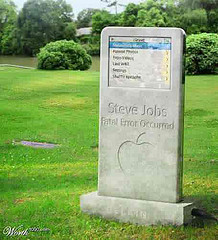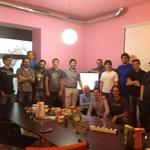June 24th, 2015 § Comments Off on miracle of modern medicine § permalink

i was at a fun dinner tonight, with almost a dozen participants. at one point we were chatting about various health topics, and two things really stroke me.
1) three out of the 11 people present had laser corrective eye surgery done. that’s almost a quarter! it’s amazing how widely spread this procedure was in the group, which is of course not representative of the whole society, but at least indicative of a decent portion of it.
2) and 9 of us have kids, but four of us had kids with some kind of developmental disorder. one had cross eye issues, one had minor asperger syndrome, two had dyslexia. nothing dramatic by modern standards, but that’s only because our health system is able to detect them early on, and fix them before they even become real problems. that’s another quarter of the population represented at the table!
i can imagine even just a hundred years ago, all these problems just developing into a grow up age, rendering a decent chunk of the society somewhat impaired.
we should feel fortunate we live in a time where such problems are fixable, in society where they are systematically detected early on, and we should feel good about paying the taxes that make both of these points possible in the first place. full stop.
February 16th, 2015 § Comments Off on should we finance all good ideas? § permalink
It seems that Slovenian society doesn’t have an agreement as to what projects should be publicly funded, so there is always pressure for more and more public financing of ‘useful’ projects, while the deficit is growing.
let’s look at the utopian approach first, let’s count how much money should the government disseminate to satisfy everything that the society produces. let’s break it down:
- we have 2M population.
- let’s assume that even retired and some underaged people can still participate in projects,
- let’s assume that importing foreigners is also an option which will compensate for the ones that couldnt participate.
- let’s also assume, that 10% of the population is capable of coming up with ideas and leading them, and that
- average size of an ideal project is 10 members.
This means that we will have 200k active projects, which will need capital to pay for 10 member’s living expenses, and the projects’ material and program expenses. let’s say this cost structure is something like:
- decent salary – $50k per person annually (average across the population)
- decent baseline annual project budget is $1M (keep in mind, that this now has to include everything that public sector is already covering – from schools and hospitals to EU projects contributions and everything in between)
this means, that if the country wanted to pay for everything, the budget would have to be:
- 2M people * $50k = $100 billion
- 200k projects * $1M = $200 billion
- so total budget would be $300 billion, and average project’s budget would be $1.5M
Slovenian budget is $10 billion, and the total GDP of the country is $50 billion. So this obviously won’t work.
Every time some new project expects public funding, it implicitly expects that if everyone did the same, the society would require $300 billion to function. Every time a new project is publicly demanding public funding, they are broadcasting this expectation into the general public. Every time a new project succeeds with this pressure, it sends the message that the society can afford $300 billion worth of public funding.
I believe it is crucial we form a broad agreement about what to do with this gap between ‘implied expectations’ and reality. We’ll look into that next time.
November 10th, 2014 § Comments Off on general disclaimer § permalink
i noticed that i often get ideas to write on this blog, but after thinking about them i realize that they might be misrepresented and thus decide not to write them. i’d hate it if this blog was the reason for any particular person or company to be misunderstood and damaged, but at the same time, i feel that each not published thought is lost opportunity for me and for the readers. so i’ve decided to write up a general disclaimer, that will be part of every provocative blog posts i publish in the future. i hope it will manage to frame my context well enough, to prevent readers from jumping to conclusions and judgements. here is the wording i’m thinking about, and i would very much welcome any improvements or feedback.
the articles and words on this blog do not necessarily represent the position of their author. strong sentences, especially such that describe people or companies or events are here to express an abstract point, and not to pass or enable or encourage judgement. please refrain from taking them as facts, but rather as building blocks of a story. author accepts feedback and complaints under comments and on email.
i hope this will relieve me from worrying too much, and to start writing more aggressive and controversial pieces, that will stir the conversations more. not because i would want to convince anyone of my points, but because i feel that not enough people are contributing to public debates, which gives unfair advantage to media and politicians and trolls. so bear with me, specially when you disagree.
October 28th, 2013 § § permalink


Live in Concert (Lou Reed album) (Photo credit: Wikipedia)
Lou is the first rock’n’roll legend I cared about to die in my lifetime. I feel lucky I have at least heard him live once, in Ljubljana. Sadly the friend that was with me then is not here anymore either. So that concert only exists in my head now.
Sometimes I wish he was my idol, because that would mean I was a musician, hopefully one of the 30.000 that bought the Velvet Underground‘s first album and went on to create their own bands.
Also, I would have to have been growing up in New York, to really appreciate his ways of navigating that particular urban jungle. I had a glimpse of that decisive city in the recent years, but the previous five decades live in his songs.
Cynically speaking, and I’m sure Lou would get a great laugh out of it as well, the great thing about being a rock’n’roll legend this century is that you don’t have to worry about your close ones. Immediately after you die, the new sales of your works make up for a great inheritance. iTunes and digital distribution made that really easy, even for the indie bands. If the Velvets were just starting now instead 50 years ago, and Lou died, it wouldn’t make much of a difference for him.
I hate cynicism. But I love Lou Reed.
October 15th, 2013 § Comments Off on Move on! Next week! Internet Week Ljubljana! § permalink

Proud to announce that my favorite startup community has matured to the stage, where we had to organize Internet Week – a whole week packed with events of various kinds, by several partner organizers, on multitude of topics. We are sponsored by the Digital Champion of Slovenia.
Startup CrawlOne of the highlights of Internet Week that’s going on in Ljubljana at the moment will take place on…Oct 23 2013restreaming.me
You should all take time between October 23rd-30th, and go visit at least a handful of the events, and get to know the community better. At Zemanta we will be hosting startup crawl next friday, when everyone is welcome to stop by for drinks and chats about the future of the web publishing.
I was fortunate to see how Internet Week NY developed, from it’s modest first year 2008, to an overwhelming festival of entrepreneurship it is now. I hope Ljubljana will follow a similar path, as it is the only way to the future.
Oh, and if you want to promote your event as well, give me a shout. happy to add it to the list. 😉
Join us. Move on.
June 24th, 2013 § § permalink


Steve Jobs (Photo credit: Kashmir Global)
Apple‘s new HQ build site opened this month, after some delays and quite some rise in costs. A lot has been written about it since Jobs gloriously unveiled the plans in Cuppertino last year, and all articles seem to gravitate towards one of the two conclusions:
- it’s going to be grand, beautiful, cutting edge office space for generations to look up to
- it’s a sign of the beginning of the decline of Apple, just like it happened to all other IT giants
Everyone agrees with the first point, but the cynical second point sounds like a stick in the mud. Sure Jobs wanted to build a monument for himself, but how can people possibly assume he was at the heights of his intellect, reinventing the whole home computing industry, and at the same his judgment clouded by a simple human sin of vanity. I don’t believe that Jobs would approve such an expensive project without a very deep and in Jobsian manner convoluted brilliant plan.
I was reading a very in-depth article covering more details of the story in Bloomberg Businessweek that exposed much more details than any before – about the builders, the challenges, the approaches. They even performed interviews with employees to shine some more light on how this spaceship is really going to be built and how it’s going to look like from inside. These interviews give a new clue about the possible real reason for the project that’s more expensive than WTC.
Supposedly all the insides will be assembled with a pre-fab modules for “bathrooms, utility closets, and banks of offices complete with carpets and window treatments”. nothing special, except that Jobs wanted high precision and attention to detail everywhere, so these pre-fab modules will be supplied by a purpose-built factories. At the same time, the building will have one of the largest private arrays of solar panels and a number of other technical advancements in construction and furnishing.
What if Apple’s new headquarters is not just a beautiful monument to the creator, efficient way to house 13000 employees and homage to HP labs and California, but also a pilot project for the next grand stage in Apple’s business expansion? After successful move-in, they will be left with a lot of public attention, a tested supply chain, solved first set of technical challenges to leapfrog one of the largest industries on the planet.
So to all you cynics out there, what do you think Jobs would do? Waste $5B and risk the success of his life work to build a building, or leverage it to expand business?
May 20th, 2013 § Comments Off on Help us create the first museum of new technologies in Slovenia § permalink


Children playing Paperboy on an Amstrad CPC 464 in the 1980s (Photo credit: Wikipedia)
I am proud to be part of a group of enthusiasts, who have 10 years ago started systematically collecting and exhibiting computer history in Slovenia. the pinnacle of this first decade was the recent exhibition Goto1982, prepared in collaboration with MNZS, that covered the cambrian explosion of home computers extensively.
Today, we are hosting a closing event for this exhibition, which is moving on to be hosted by Technical Museum of Slovenia for the next 12 months. We are extremely proud to be recognized and trusted by both institutions, and by thousands of visitors who left very optimistic comments, like “omg, this was my first one!“, and “this is confusing, i feel young and old at the same time“. thank you all!
We are more sure than ever, that technology is not just part of everyone’s lives today, but essential ingredient in everyone’s personal story. Each and every one I talk to these days doesn’t feel intimidated or bored by the idea of this Museum, quite the contrary – with glitter in the eyes, everyone starts listing objects from their past that they have been safely storing until now.

We are opening a new chapter today – we will be announcing the founding of Computer Museum Society, and inviting new members and supporters to join. Our plan is to build a different museum – one that will not only educate about the past, but also think ahead, educating the youth and bringing together professional communities.
To do this next step, we first need your help. We need you to raise your hand in support and basically say: “yes, computers and other contemporary technologies have made me what I am today, I don’t want this to pass by unexplored.”
You can support our efforts by:
- showing up tonight, at 6pm in MNZS
- becoming ‘supportive member’ with a donation, which gets you the right to wear exclusive t-shirt, learn about our next steps in real time and your place on our wall of fame
- thinking of 10 friends who might support our cause and telling them about it
Thanks!
March 18th, 2013 § § permalink

I gave several book interviews since starting Zemanta and moving to NYC, most of them in the last 18 months. Lots of authors are exploring the technology revolution that we were fortunate to participate in.


Books are coming this year, discussing it from various angles – comparatively with .com boom, the rise of entrepreneurship Europe, new entrepreneurship as a lifestyle, … It is no surprise to me, that the first book to actually publish is the one specifically celebrating NY tech community and agility and resilience.
Tech and the City became available on Kindle two days ago, and hardcopies are coming in April. I received the notification from the authors this morning, and already I’m half way trough it. It’s that good.
It starts with an amazingly inspiring foreword by Fred Wilson, which alone is worth the $2.99, as it perfectly outlines the mental model of the greatest city on the planet. After that, the book only gets better, weaving the story trough fragments of conversations with participants in the ecosystem, rather than lazily throwing together yet another series of interviews. This enables the book to read like a travel diary, rather than a self-hype-help business manual.
For the finish, the authors have collected a very comprehensive list of the NY tech ecosystem institutions – vc’s, events, co-working spaces and competitions. They have also published them on the official blog of the book.
It’s cheap and it’s short, and it’s awesome. Go read it and learn how you should be thinking about helping entrepreneurs in your cities / countries.
January 25th, 2013 § Comments Off on we’re all made of math § permalink


(Photo credit: Wikipedia)
reading a great summary of 17 equations that changed the world. great stuff, go check it out.
I love how each of these formulas captures en entirety of a part of our world into a simple 2-d graphic 🙂
however, there is one formula missing here, a rather important one. it’s an equation, that sums it all, well, almost everything. everything that we could have summed up so far in the history of science. the grand, unified theory of everything.
GUT is a theory that connects three of the four forces that shape our world. Only gravity is missing in this connection, before we can claim we really can model the world. and my mind was blown when i first realized that we can write it up into a single page-long formula. here it is, in all it’s glory.
September 4th, 2012 § § permalink
“It is amazing what you can accomplish if you do not care who gets the credit.” Harry S Truman, 33rd president of US (1884 – 1972) source
I heard this quote a while ago, and was shocked by how accurate it is, and how overlooked it is most of the time.
One reason is probably, that everybody likes to be patted on the back. But if one needs it all the time and publicly, it creates some friction in the system, that slows everyone down. That friction comes in the form of envy, being secretive, not helping ‘just because’. In short run it gives some emotional satisfaction, but in the long run, the one’s vicinity is slowed down compared to other communities.
On the other hand, there is a trap for those who don’t pay attention. This quote reminds me somewhat of another one:
“If a tree falls in a forest and no one is around to hear it, does it make a sound?“
Which I think sums up the fear of the person affected quite well – if I don’t take credit, I’ll never have anything. A naive response to this is the one that we described earlier. Smarter response is being humble, but keeping a close watch on actions of others, and preempting situations in which the reality might become permanently distorted.
Clarity and transparency is what everyone should be fighting for, not individual’s achievements.
- Three Ways to Look at Leaders … (strategiclearner.wordpress.com)



































